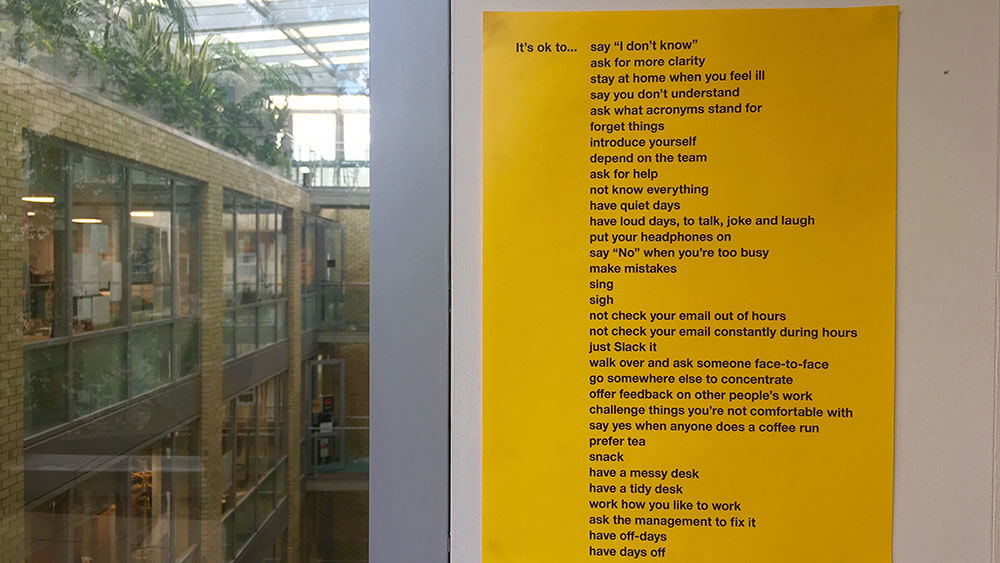
Writer Giles Turnbull wanted to emphasize to new employees at his organization that it was okay to do things like ask for help or make mistakes, so he came up with an “It’s Okay to…” list and poster for the office.
In our August 2019 issue, when we focused on the future of work, we skipped over the part where, a short seven months later, a pandemic would force a broad swath of workers to work from home.
In our cover story that month, we shared how workplace experts and scientists believe that in a future in which artificial intelligence looms large, leaning into what makes us human — “your messy, emotional, caring, creative, problem-solving, sense-making, and relationship-building self,” we said back in the summer of 2019 — will spell on-the-job success.
COVID-19 has changed the rules about most of our everyday life, including office culture. And when many aren’t actually going to a physical office to get their jobs done but are toiling away in makeshift home offices, where kids and pets and spouses Zoom bomb our calls, that culture has definitely become more human — more messy, but also more caring, and more creative, if only to make our current situation work for us.
As part of that story last August, I interviewed Liz Fosslien, who co-authored the book No Hard Feelings: The Secret Power of Embracing Emotions at Work with Mollie West Duffy. Their “Liz and Mollie” newsletter this week seemed especially relevant at this moment. They wrote:
“During stressful times (i.e., right now), it’s good practice to write down the unstated cultural and emotional norms that exist within your team or company. In our book No Hard Feelings, one of our most popular suggestions has been to write an ‘It’s okay to…’ list. We got the idea from the writer Giles Turnbull, who wanted to emphasize to new employees at his organization that it was always okay to do things like ask for help, make mistakes, and have off days. He drafted a list, asked his colleagues to add other ideas, and then designed posters that he hung all over his office. You can see his list here.
“Given that many of us suddenly shifted to remote work earlier this year, we encourage teams to write COVID-specific ‘It’s okay to…’ lists. You might include things like ‘It’s okay to…’:
- Turn off your video if you need a break during longer calls
- Shift your hours earlier or later to accommodate your family
- Have a child or pet pop into the video screen
- Block off no-meeting time on your calendar for focused work
“We’ve also heard of a few organizations in the U.S. that are creating election-specific lists ahead of November 3 that include items like ‘It’s okay to…’ form discussion support groups, take the day off to vote, or ask for help prioritizing work if you feel overwhelmed.”
Almost all of the Convene editorial team has worked out of home offices from the day we were hired, but recognizing that we’ve been pretty much homebound since March, I’ve intentionally given us more time to talk about what we’re thinking and feeling during our biweekly Zoom calls, when we set the editorial schedule and brainstorm story ideas. And in the spirit of the Liz and Mollie newsletter, this week I asked everyone on the team to share what they’ve given themselves permission to do — or not do — during the pandemic. We’ve decided that “It’s okay to…”
- Dress comfortably
- Not be as sure of things as you used to be
- Request a voice rather than video call
- Be specific about your comfort level on any given day
- Take a walk in the middle of the day to clear your head
- Treat yourself
- Let your hobby (okay, maybe it’s become an obsession) help keep that always-on work mentality in check
Do you have an “It’s okay to…” list? We’d love to hear what’s on it.
Michelle Russell is editor in chief of Convene.
